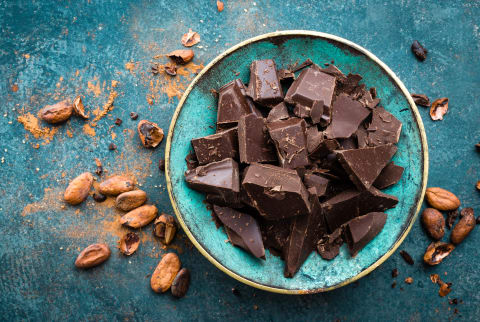Advertisement
Why Dark Chocolate Might Be the Sweetest Way To Lower Diabetes Risk


What if your Valentine's Day indulgence could also help protect your health? According to research, enjoying a bit of dark chocolate might just be one of the tastiest ways to lower your risk of developing Type 2 diabetes.
The sweet science: dark chocolate & Type 2 diabetes
In this extensive study1 spanning more than 30 years, researchers followed the health and dietary habits of 192,000 adults who did not have diabetes at the start. Participants reported on their chocolate consumption, body weight, and diabetes status over time.
The results? Those who consumed at least five servings of dark chocolate per week had a 21% lower risk of developing Type 2 diabetes compared to those who didn't indulge.
Even better, each additional serving of dark chocolate per week was associated with a 3% further reduction in diabetes risk.
Why dark chocolate?
It all comes down to cocoa content and bioactive compounds. Dark chocolate, which typically contains 50-80% cacao, is packed with beneficial flavonoids like flavan-3-ols and epicatechin. These compounds are thought to:
- Improve insulin sensitivity
- Protect pancreatic beta cells from oxidative damage
- Reduce inflammation linked to metabolic disorders
- Improve blood vessel function and glucose metabolism
Milk chocolate, on the other hand, contains more sugar and less cocoa (around 35%), diluting any potential health benefits while contributing to weight gain.
To reap the benefits highlighted by this research, choose dark chocolate with at least 70% cocoa. This ensures you're getting a richer concentration of those powerful antioxidants without excess sugar.
No weight gain worries
Interestingly, the study also found that dark chocolate consumption wasn't associated with weight gain, while milk chocolate intake was linked to weight gain over time.
This suggests that dark chocolate's unique nutrient profile may help offset concerns about calories or fat content when consumed in moderation.
Chocolate goodies that are nutritious & delicious
Here are a few simple and oh-so-delicious dark chocolate recipes to try out this Valentine's:
- No-sugar chocolate cherry truffles
- Blood-sugar-friendly chocolate walnut bars
- No-bake chocolate almond butter bars
- Fiber-packed coconut-pecan chocolate tart
The takeaway
As love fills the air this Valentine's Day, why not lean into the season and treat yourself—or a loved one—to a few squares of high-quality dark chocolate? It's a delicious way to show yourself some love while supporting long-term health.